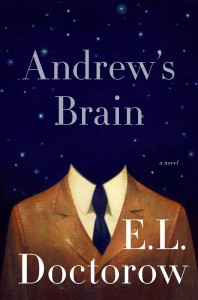“The great problem confronting neuroscience is how the brain becomes the mind. How that three-pound knitting ball makes you feel like a human being.” —”Andrew’s Brain”
“Call me Edgar, like the good son in ‘King Lear,’” said a smiling E.L. Doctorow, answering me this past winter at a library benefit in Sag Harbor, a town where we both make our home. I was unsure how to address him: Ed? E.L.? Mr. Doctorow? Probably a common inquiry, as the response was quick and full of humor.
At age 83, E.L. Doctorow has published his 12th novel, Andrew’s Brain, a clever installment in the centuries old debate of the Mind/Body problem. As neuroscience grew in the 20th century with its attendant psychopharmacology, the fields of psychology and philosophy of the mind have taken a back seat.
A broken brain can affect the mind, but in turn we can also observe the somatic effects of a disturbed mind on the body; they are together but often appear separate and are often studied as if they were foreign countries.
Doctorow sets up a probing and simple dilemma: take a cognitive scientist steeped in the western tradition of scientific method and break his mind. That’s it, the simple premise. Horrible events befall our Andrew that are much “sharper than a serpent’s tooth” as King Lear was made to say and he ends up talking to his brain in a 200 page mutual interview.
Plato speculated that the mind, or soul, was from the world of ideas whereas the brain was merely matter. The matter would die but the soul would return to the world of forms. Aristotle believed the alleged separation to be foolish that the mind was no more separate from the body than a wax was separate from its shape. Between these two extremes are variations on both argued by Immanuel Kant, Karl Popper, Rene Decartes and almost anyone else who could hold a pen. It’s a large subject.
Doctorow sets up mental mayhem the likes of which is rarely seen outside of ghastly war stories: The book begins with the Andrew of the title carefully feeding his infant girl medicine from an eye-dropper until she peacefully falls asleep. Not. The prescription had been mis-filled and he has killed his new baby.
His relationship with his wife ends, he divorces and wanders around a bit. Ultimately he remarries and has a new baby with a beautiful young woman, a former student, but she disappears in the rubble of September 11. Unable to cope as a single parent, he brings the second infant to his previous wife, who raises the child.
This tag-team of grief would ruin any mind, and so it ruins Andrew’s. He can find little solace in his knowledge of the organic. He seems to be talking with himself through much of the book, although a psychiatrist does make a brief appearance on a single page.
For dimwitted book reviewers, Doctorow lights a neon sign early on: “Writing is talking to oneself.” And indeed this is what most of the book consists of, Andrew coping by speaking with his brain, the seat of his mind.
I’ve always been fond of big scenes on small sets: “12 Angry Men,” a riveting play and movie by Reginald Rose lasting two hours in a single jury room, is among my favorites, as is the movie “Phone Booth” by Larry Cohen, wherein Colin Farrell spends the entire film inside a phone booth that he dare not leave because of a sniper’s threat.
These extreme small sets show off the writer’s skills, and so does Andrew’s Brain with the smallest of sets: one man’s mind. It displays the taut wit and immense literary skill of Doctorow, with no detail too small to illuminate. In one scene, Andrew is handicapping his status based on where he is seated at a dinner table:
"We sat below the salt along with the secretaries and family business flunkies, none of whom were interested in talking, a spiritless lot suffering their lesser stature in silence while the formal reception and many toasts went on at the far end.
Seated “below the salt”: I dare say no one can read this and not worry thereafter where the salt shaker is placed at their next dinner party. While not unknown as a signifier of status, the phrase has not been in use in a literal sense for centuries, since the days when salt was a rare and precious commodity.
This and dozens of other small vignettes appear here and there as detours in the flow of sentences. Italo Calvino once spent an entire chapter in Invisible Cities on gutter leaders, the long pipe that runs from the gutter to the ground. I dare say Doctorow could properly expand such a digression into book by itself.
The cognitive scientist Andrew and his brain have a life, a difficult life, one that brings the suffering of the mind into a sharp focus, over and above the organic mechanisms of one’s biology. Andrew’s thoughts about his suffering led him to search for a balm beyond the realms of brain science:
But don’t think about these (brains) because it won’t be you anyway doing the thinking. Just follow your star. Live in the presumptions of the socially constructed life. Abhor science. Sort of believe in God. Put your failing behind you. Present your self-justifications to the bathroom mirror.
And so its goes for Andrew. Great book, highly recommended.
BASIC FACTS: Andrew’s Brain by E.L. Doctorow is published by Random House, 209 pages. First Edition edition: January 14, 2014.
HAMPTONS INSIDER: E.L. Doctorow is based in the Hamptons in Sagaponack. He has taught (and randomly appeared) at the Southampton Summer Writer's Conference, currently held at Stony Brook Southampton.
_______________________________
Copyright 2014 Hamptons Art Hub LLC. All rights reserved.

